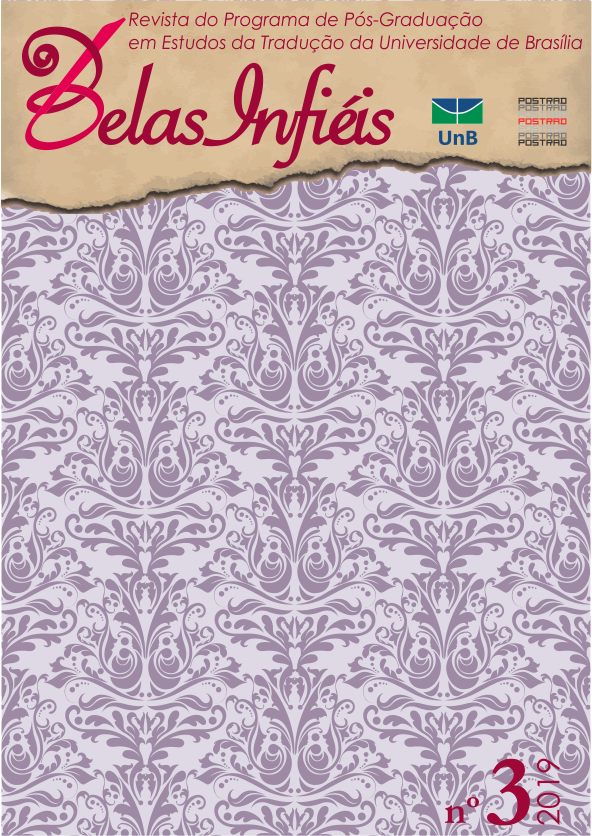La traduction d’un album illustré dans un contexte universitaire : analyse des traductions français-espagnol de Yakouba de Thierry Dedieu
DOI :
https://doi.org/10.26512/belasinfieis.v8.n3.2019.23067Mots-clés :
Album illustré. Traduction. Techniques de traduction. Traducteurs en formation. Contexte universitaire.Résumé
La traduction d’un album illustré peut constituer une tâche complexe en raison des caractéristiques de ce type d’œuvre littéraire. Des questions telles que la relation entre le texte et l’illustration, la double page, l’oralité, le public visé, entre autres, sont quelques-uns des défis posés par la traduction d’un album. Pour cette raison, le traducteur chargé de ce type de traduction doit posséder les connaissances et les compétences requises pour produire une version adaptée à la langue et à la culture cible. Un des moyens de préparer et de former ce professionnel est par le biais d’un projet de traduction reproduisant une situation réelle de traduction littéraire, notamment à partir de la traduction d’albums illustrés. Dans cet article, nous allons étudier les problèmes rencontrés par un groupe d’étudiants de traduction, ainsi que les différentes approches qu’ils adoptent lors de la traduction du français vers l’espagnol d’un album illustré intitulé Yakouba de l’auteur-illustrateur Thierry Dedieu. Tout d’abord, nous présenterons le cadre théorique en relation avec le thème central de notre étude. Par la suite, et étant donné qu’il s’agit d’un exercice de traduction dans un contexte universitaire, nous préciserons les conditions dans lesquelles cette activité s’est déroulée et les objectifs poursuivis avec la réalisation de ce projet. Puis, nous décrirons les principales caractéristiques de l’ouvrage à traduire et enfin, nous observerons les différents niveaux auxquels les difficultés de traduction peuvent apparaître et les solutions proposées par les étudiants dans chaque cas. Tout cela nous permettra d’identifier le comportement le plus fréquent de ces traducteurs en formation et les techniques qu’ils utilisent habituellement lors de la traduction d’un album illustré.
Téléchargements
Publié
Numéro
Rubrique
Licence
Copyright Statement
Given the public access to this journal, the texts are free to use but requires the recognition of the original authorship and initial publication in this journal to be properly stated.
The journal allows the use of works published for non-commercial purposes, including the right to submit the work to publicly accessible databases. Published contributions are the sole and exclusive responsibility of the author(s).
- When submitting papers to be evaluated by the Belas Infiéis journal, the author(s):
- Declare that the contents of the contributions are original and of their original creation, being entirely responsible for their content if there is an objection by third parties.
- Claim to be aware that they should not commit academic plagiarism.
- Declare that the manuscript has not been published, completely or partially, in Portuguese or another language. If it is a translation it should be submitted to the Translated Articles section.
- Declare that the manuscript is not being evaluated by other journals.
- Declare that the manuscript was not submitted to another journal simultaneously.
- Commit(s) to inform the journal of any kind of error or inaccuracy in their contribution (published, in evaluation or in editing) and to collaborate with the editors to make due corrections of the article (when in evaluation or editing) or erratum/retraction (after publication).
- Declare that there is no conflict of interest regarding the published work.
- Authorize its release if it is accepted for publication without any kind of monetary compensation.
- Agree to assign non-exclusive rights to publication to the magazine, remaining free to make their contribution available in other media as long as the publication of the first version in Belas Infiéis magazine is mentioned. They also authorize Belas Infiéis to assign their texts for reproduction in content indexers, virtual libraries and similar platforms.
- Maintain copyright and grant the journal the right of first publication, the work being licensed under theCreative Commons Attribution License.
- Is/Are allowed and encouraged to publish and distribute their work online after the editorial process, which may increase the impact and citation of the published work.
- Authorize the editorial team to make textual adjustments and to adapt the article to the publication rules, when necessary.



















